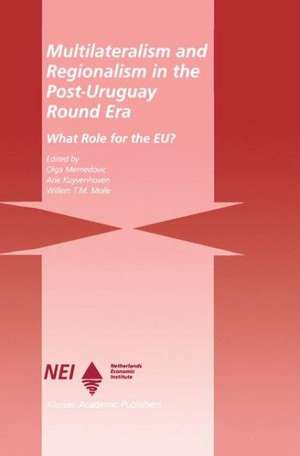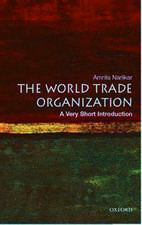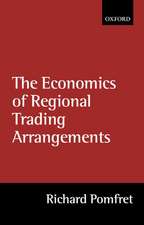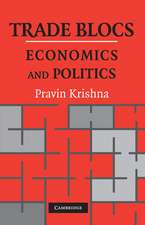Multilateralism and Regionalism in the Post-Uruguay Round Era: What Role for the EU?
Autor Olga Memedovic, A. Kuyvenhoven, Willem T.M. Molleen Limba Engleză Paperback – 28 oct 2012
| Toate formatele și edițiile | Preț | Express |
|---|---|---|
| Paperback (1) | 931.38 lei 6-8 săpt. | |
| Springer Us – 28 oct 2012 | 931.38 lei 6-8 săpt. | |
| Hardback (1) | 937.26 lei 6-8 săpt. | |
| Springer Us – 30 oct 1999 | 937.26 lei 6-8 săpt. |
Preț: 931.38 lei
Preț vechi: 1135.83 lei
-18% Nou
Puncte Express: 1397
Preț estimativ în valută:
178.30€ • 183.37$ • 147.92£
178.30€ • 183.37$ • 147.92£
Carte tipărită la comandă
Livrare economică 18 februarie-04 martie
Preluare comenzi: 021 569.72.76
Specificații
ISBN-13: 9781461373810
ISBN-10: 1461373816
Pagini: 356
Ilustrații: XX, 331 p.
Dimensiuni: 155 x 235 x 19 mm
Greutate: 0.5 kg
Ediția:Softcover reprint of the original 1st ed. 1999
Editura: Springer Us
Colecția Springer
Locul publicării:New York, NY, United States
ISBN-10: 1461373816
Pagini: 356
Ilustrații: XX, 331 p.
Dimensiuni: 155 x 235 x 19 mm
Greutate: 0.5 kg
Ediția:Softcover reprint of the original 1st ed. 1999
Editura: Springer Us
Colecția Springer
Locul publicării:New York, NY, United States
Public țintă
ResearchDescriere
The Post-Uruguay Round era has seen a proliferation of regional preferential trade agreements (PTAs) as well as progressive multilateral trade liberalization initiatives. This has stimulated theoretical discussion on whether the policy of pursuing PTAs will have a malign or a benign impact on multilateralism. In the former case, proliferation of PT As may increase protection in global trade due to trade diversion effects, thereby creating impediments to multilateral freeing of global trade. In the latter case, the expansion of PTA membership could ultimately lead to non-discriminatory global free trade. At the core of this discussion is the question of how to explain the preference for PTA membership. While some economists view the expansion of PTA membership as exogenously determined, participants of the Fourth Annual Workshop of the Network EU-LDC Trade and Capital Relations also considered endogenous factors explaining increased PTA membership. This book offers a closer look at the motives of policy makers in both developed and developing countries to still adhere to PTAs, notwithstanding the theoretical superiority of multilateralism, and addresses the question of how to bring order into the world trading system. These issues are dealt with in 9 chapters by scholars from both the EU and LDCs. Each paper is discussed in terms of its policy relevance by a policy maker as well as by an academic specialized in the field.
Cuprins
List of figures. List of tables. Preface. Acknowledgements. List of contributors. Part One: Overview. 1. Economics and Politics of the EU-Route Towards Global Free Trade; O. Memedovic, et al. Part Two: Systemic Issues. 2. Multilateralism and Regionalism in the Post-Uruguay Round Era: What Role for the US? J.N. Bhagwati. 4. MFN-Based Freer Trade and Regional Free Trade: What Role for the EU? P.A. Messerlin. 4. Bilateral Trade Agreements with the EU: Driving Forces and Effects; J. Pelkmans, P. Brenton. Part Three: EU Market Access for LDCs. 5. Regionalism and Globalization: The LDC's and the Single European Market; P. Buigues, C.M. Mongay. 6. How Important are Trade Defence Measures and Non-Tariff Barriers for LDCs - with Particular Emphasis on Those of the EU? M. Auboin, S. Laird. Part Four: EU Market Access: Regional Views. 7. The View from Africa; T. Ademola Oyejide. 8. The View from Latin America; V. Thorstensen, F. Peña. 9. The View from Asia; P.B. Rana. Index.















